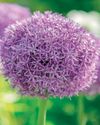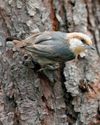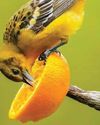
In the crunch of the annual fall cleanup, remember to make time for perennial care too.
Cutting back foliage protects flowering plants from disease and provides a clean start for regrowth.
But many perennial plants are worth leaving up if they're healthy, since letting them stand for winter can increase their hardiness and benefit wildlife.
Dick Zondag, former president of Wisconsin-based J.W. Jung Seed Co., offers tips for getting perennials ready, if you choose to trim them. So grab a pruner and start cropping these 10 plants.
1. IRIS
This showy summer favorite is vulnerable to infestations of iris borers, which tunnel into the base of the rhizome to lay eggs. Trim the fan of sword-shaped leaves at an angle so they slope upward into a center peak no higher than 6 to 8 inches. Then remove any dead or dried leaf debris.
2. BEE BALM
Cutting back this plant keeps it healthy for the hummingbirds and butterflies that flock to it in midsummer. Bring it right down to the soil to discourage problems such as mildew. If plants show signs of mildew, dispose of the cuttings instead of composting them.
3. PEONY
This story is from the October/November 2023 edition of Birds & Blooms.
Start your 7-day Magzter GOLD free trial to access thousands of curated premium stories, and 9,000+ magazines and newspapers.
Already a subscriber ? Sign In
This story is from the October/November 2023 edition of Birds & Blooms.
Start your 7-day Magzter GOLD free trial to access thousands of curated premium stories, and 9,000+ magazines and newspapers.
Already a subscriber? Sign In

Basics of Hydroponics
Use these top tips and plant picks to have a successful soil-free garden

Rooted in Resilience
These hardy perennials will thrive in most zones

Social and Supportive
Brown-headed nuthatches take a helpful approach to raising their young

All About Owl Pellets
And why you should give a hoot about them

Ask the Experts
Advice from our pros about houseplants, bird feeding and more

BRING THE OUTDOORS IN
Making a terrarium is about as close as you can get to a Zen DIY project. Once you have gathered the proper materials and squared away your plant selections, it's as simple as layering it all together and watching your mini ecosystem thrive. Here, I'll walk you through my foolproof process and cover all the required elements for good filtration, healthy soil, strong root growth and resistance against fungus and disease.

GROW THIS. NOT THAT
Six easy-to-grow houseplants—and six that may not be the right choice for you

Winter MAGIC
Forecasts may be frigid, but grab your binoculars because birding opportunities are still incredible

Sense or Nonsense? - Why some birds can taste and smell - but others can't
Does a porcelain berry taste like a blueberry to a gray catbird? Does a block of lard smell like frying bacon to a northern flicker? The short answer is no. While some avian species do have a well-adapted sense of taste or smell, they can't distinguish between flavors and odors the way humans can. They're not picking up every ingredient in the suet you put out, says José Ramírez-Garofalo, an ornithology researcher at Rutgers University in New Jersey and the director of Freshkills Biological Station in Staten Island, New York.

Maple Mania - Amazing facts about this fall foliage mainstay
Amazing facts about this fall foliage mainstay